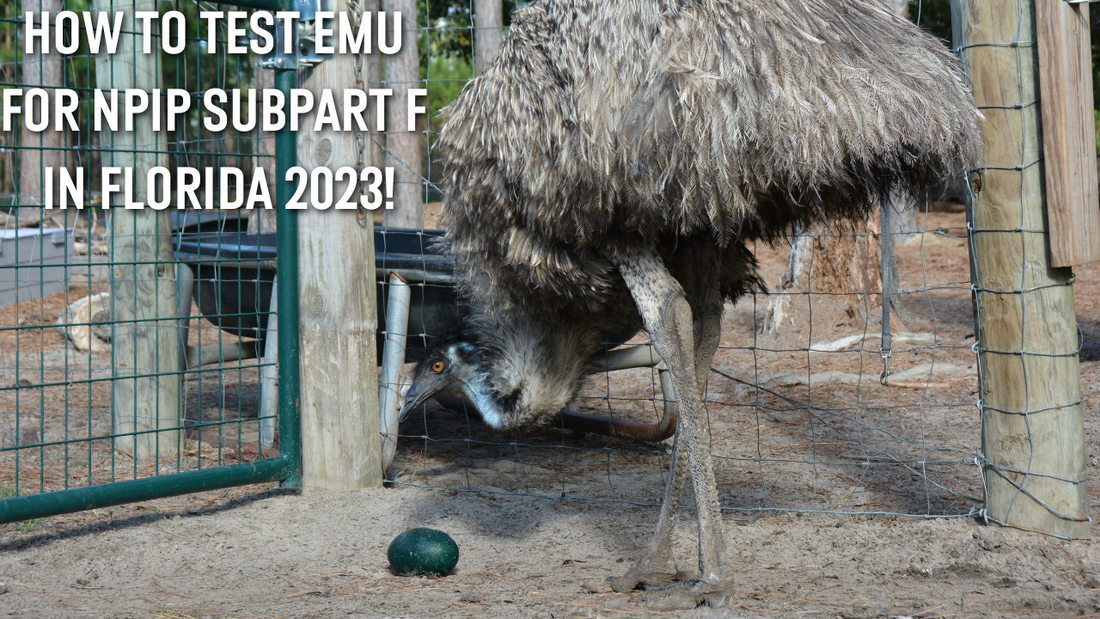
How To Conduct A Florida NPIP Subpart F Emu Inspection
Share
In this post, we will be walking you through the testing procedures that are required in Florida right now in January of 2023 to legally transport emu chicks and eggs across state lines. A little disclaimer before we jump in, these rules do rapidly change, and by the time you are reading this, some of these rules may have changed already, so make sure you go directly to FDACS or NPIP to keep up to date on the current rules, but today we will break down the basic bulk of the “rules,” and we will show you how we conducted the tests in the attached YouTube Video. This post/video should not be construed as legal advice; these are merely a presentation of the facts as we understand them.
In Florida, through the National Poultry Improvement Program, producers are required to get their subpart F designation to ship eggs and chicks across state lines. Other states have their own rules and requirements, so we recommend reading up on your state’s requirements before transporting chicks or eggs in or out of your state. Some states do not require any of the tests we will be conducting today, and some of the states require much more than what we will be testing for today, so let’s read about what those of us here in Florida are required to have in order to transport chicks and eggs and then watch our YouTube video to see a demo of us conducting the tests.
First and foremost in order to get your subpart F to transport chicks and eggs here in Florida, you must join the National Poultry Improvement program, to do this, you will need to contact FDACS, also known as the Florida Department of Agriculture and Consumer Services. You will then be put in contact with your local FDACS NPIP inspector and can schedule a time to meet and test your flock. The NPIP program (National Poultry Improvement Program) does not only apply to emus; it applies to many species of birds, including chickens, turkeys, waterfowl (ducks, geese, swans), pheasants, quail, peafowl, guineas, chukars, grouse, ostrich, emu, rhea, and cassowary. So if you already have one of these species of birds, it can be very beneficial to join NPIP. The main benefit of NPIP for us as a farm is that we can legally transport eggs and chicks across state lines. If we buy chicks or eggs from someone else, they must also be NPIP, which means we know we will be buying chicks/eggs from a vetted farm that has been tested clean and healthy. For those interested in showing birds, NPIP is often required to be in a show to ensure you have a good bill of health on your stock before you bring them near other people’s stock. By maintaining membership with NPIP, we are the first line of people to hear about disease outbreaks and can better prepare and enforce our biosecurity practices.
Now that we have gotten through most of the technical aspects of why you should join NPIP and the program's purpose, let’s talk about and look at the nitty gritty of the testing process. It's important to note that a veterinarian is no longer required to be onsite for these testing procedures but is encouraged if your emus are hard to deal with. In order to keep the inspectors safe, the inspector is not allowed to enter the pen with the emu, but his presence is required. There will be links at the bottom of this post to the tools we provide to test our emu; the inspector will also bring some of the materials required. Two tests must be conducted to obtain your subpart F; the first test we will discuss is the Pullorum-Typhoid test, also known as a Salmonella test. This test involves clipping a toenail to get a small amount of blood. This blood is then mixed with an antigen on a plate by the inspector to test for Salmonella. We like to get the emus' feet onto a rubber mat with a towel to keep the workspace clean; we will clean off the bulk of the dirt on their feet and toes. We then take our safety clippers and slowly take small sections off the end of their toenail until we begin getting blood. The inspector should provide a ring tool or small vial to catch a minimal amount of blood in. You should only need a few drops of blood, as you will see in the video. You will then hand your ring tool or vial of blood over the fence to your inspector, and they will mix the blood with the antigen on a plate to get your result. Once we have the sample, if the toenail is still bleeding, we use two different types of styptic to clot the blood and stop the bleeding, just a little bit of time running around in the dirt will also help stop the bleeding and if done correctly, there should not be an immense amount of blood.
The second test is typically easier; this is the Avian influenza test. Emu have a large V-shaped slit in the top of their mouth. This test is conducted by taking a cotton swab and rubbing it along the top of their mouth in that slit. The cotton swab is provided by the inspector, and once you have swabbed that slit inside their mouth, you can hand it back to your inspector. The swab must be sent off to a lab, and it can take a few days to get results back on.
Once your results have come back, and as long as you are labeled with a clean bill of health, congrats! You have successfully gotten your subpart F. Now click here to view some video of an actual test being conducted on our farm; this was our 2023 testing conducted on 1/11/23. We were thankful to have Dr. Richardson, Inspector Yant, and Inspector Hill on the farm to set the record straight on the current testing requirements for FL and oversee the best way to conduct the tests.
As you can see in the video, it can sometimes be a bit frustrating trying to get everyone to cooperate. Emu can be stubborn, but the testing can be completed with some patience. The method we use is undoubtedly the safest way to conduct these tests. Remember to maintain a calm atmosphere, take your time, get as much help as needed, and hire a vet if needed.
Thanks for reading!
For more in-depth information, visit our YouTube Channel and watch our Emus 101 Series here
Emu Apparel
Links to Products we personally use for testing:
Tractor Supply Options:
Amazon Options:
Miracle Care Kwik Stop Styptic Gel
*As an Amazon Affiliate, we earn from qualifying purchases. Thank you for your support!
*As a Tractor Supply Co. Affiliate, we earn from qualifying purchases. Thank you for your support!

